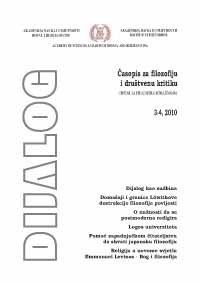Kriza vremena i kritička analiza povijesti Löwithova kritička teorija
The Crisis of Time and the Critical Analysis of History Löwith’s Critical Theory: Urbanity and Skepticism
Author(s): Abdulah ŠarčevićSubject(s): Philosophy
Published by: Akademija Nauka i Umjetnosti Bosne i Hercegovine
Keywords: anthropocentrism; crisis of time; eschatological schema; Hegel; Heidegger; Löwith; Marx; myth of History.
Summary/Abstract: A more careful and detailed study of Löwith’s major work on Meaning in History (1949) will make us much more careful and prudent in our appraisal of his basic ideas. Löwith rejects every attempt at totalizing and hypostatizing the destiny of history within some universal characteristic of Being. No matter whether it belongs to a speculative, positivistic or materialistic philosophy, to the work of Hegel, Comte or Marx, the eschatological schema is put into doubt. Löwith believed to have demonstrated a crucial insuffi ciency of epochal philosophies. Hegel’s metaphysical historicism, Marx’s historical materialism and Heidegger’s speculative descriptivism, they are all unable to help us understand the world because of their inherent anthropocentrism. However, as a critic of the myth of History, Löwith runs the risk of taking a particularly conservative attitude, of falling back to what the history has left behind long time ago: the self-understanding of ancient Greek cosmology. The author has attempted to examine the risk.
Journal: Dijalog - Časopis za filozofiju i društvenu teoriju
- Issue Year: 2010
- Issue No: 03+04
- Page Range: 21-61
- Page Count: 41
- Language: Bosnian

